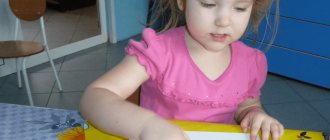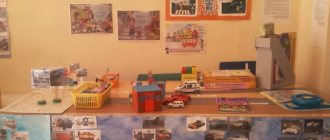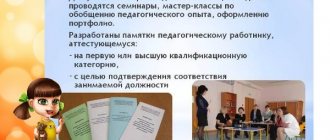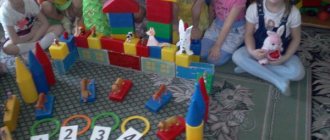Self-education plan for senior group teacher V.I. Mayorova.
Content
| Term | Subject | The content of the work | Practical solution |
| September b 2015 | Selection and study of literature on the topic, didactic games and exercises; plot paintings. Attending advanced training courses according to the Federal State Educational Standard. | Memo for parents on learning coherent speech. Writing the final project. | |
| October | Work on composing stories based on plot pictures. Compilation of the story “Autumn”. | Teach children to look at a picture and highlight its main characteristics. Learn to compose a story based on the teacher’s example. | Thematic lesson “Hello, autumn!” |
| November | Games and exercises for the development of coherent speech. Learning the didactic game “Who am I”? | Improve speech hearing, strengthen expressive speech skills and communicative qualities of a preschooler. | Introduce parents to games that influence the development of children's speech. Consultation for parents “Speech games and exercises in the development of a child’s speech.” |
| December | Development of speech through theatrical activities. Dramatization of the fairy tale "Teremok" | Development of creative independence, aesthetic taste in conveying an image, revealing the creative abilities of children. | Practical demonstration. |
| January 2016 | Work on composing riddles. | Show the role of riddles in the formation of expressive speech. Learn to solve riddles. | Consultation for parents “Using riddles as a means of expressive speech.” |
| February March | Writing a descriptive story (describing animals) Reading and discussion, retelling fairy tales. | Expand children's vocabulary by practicing describing objects according to a diagram. , Teach your child to listen carefully to a fairy tale, answer questions, and consolidate communication skills. Activate speech. | Conversation with parents “The role of descriptive storytelling in expanding children’s vocabulary.” Consultation for parents “The role of fairy tales in the development of children’s emotionality.” |
| April | Learning counting rhymes, tongue twisters, nursery rhymes with children. | Strengthen your expressive speech skills and improve your speech. | Memo for parents “Level of speech development 4-5 years old.” |
| May | Report on the topic of self-education. | Speech at the teachers' meeting. |
Topic : Development of coherent speech in preschool children (middle group)
Relevance of the topic
: This topic is important to me because a child’s speech is a key moment in his development. The success of pupils in coherent speech ensures in the future and to a greater extent determines success when entering school, contributes to the formation of full-fledged reading skills and improves spelling literacy. As a teacher, this really appeals to me. After all, work on speech development is the ability to choose the right words and use them correctly in speech, to construct sentences and coherent speech.
As practice has shown, children are very fond of creativity, as well as independence and the opportunity to compose and tell their friends.
. I try to get the children to show their attitude towards what they saw, what they especially liked, what interested them and why, what conclusions they drew. All this prompted me to pay much more attention to the development of coherent speech.
Target
: Development of free communication skills with adults and children.
Tasks:
– improve the dialogical form of speech;
– develop a monologue form of speech;
- learn to retell short tales coherently;
– teach how to talk about a subject using a model; the content of the plot picture;
– develop the ability to write stories.
MBDOU Temnikovsky combined kindergarten "Golden Cockerel"
Individual plan for self-education
Subject
: “Development of coherent speech in preschool children
FULL NAME. :
Mayorova V.I.
Specialty: “ Russian language and literature ”
Higher education
Work experience as a teacher : 31 years.
Qualification category: Compliance with the position held
Advanced training courses :
MRIO, 2020
.
Start date of work on the topic :
From September 1, 2014
.
Estimated completion date : 1.09.2018
infourok.ru
Middle group. Junior preschool age. Children 4 - 5 years old
Self-education plan “Development of fine motor skills in children of primary preschool age 3 years old” Municipal budgetary preschool educational institution Askiz kindergarten “Rodnichok”
Self-education plan “Development of fine motor skills in children of primary preschool age 3 years old”
Educator: Taburchinova N.M. Askiz 2020 Goal: Development of fine motor skills and coordination…
Self-education plan “Education of ZKR in children of primary preschool age through oral folk art” Self-education plan on the topic : “Education of sound culture of speech in children under preschool age through oral folk art” Compiled by teacher: Kudryavtseva I.V.
2020-2021 Goal: To increase your own level of knowledge in the process of studying the features of the development of sound…
Teacher's plan for self-education
| MainOO | . Playing off the plot of your favorite cartoon. Goal : develop the ability to compose verbal descriptions based on the perception of a cartoon. .
Preliminary work: 1. Observation of the work of the teacher, assistant teacher. Goal and objectives:
Preliminary work: 1. Goal and objectives: Goal and objectives:
Preliminary work:
. Thematic role-playing game “Hospital” Goal and objectives:
Preliminary work:
. Thematic role-playing game “Shop” Goal and objectives:
Game situations:
. Story-role-playing game “Beauty Salon” Goal and objectives:
Preliminary work:
Game materials: Goal and objectives:
. Role-playing game “We are military intelligence officers” Goal and objectives : develop the theme of paramilitary games, teach children to be attentive, careful, cultivate respect for military professions, a desire to serve in the army, expand children's vocabulary - “reconnaissance”, “scouts”, “sentry”, “security”, “soldiers” " Game actions:
. Thematic role-playing game “Cosmonauts” Goal and objectives: Monitoring of children’s achievements on the topic “Role-playing games as a means of speech development for preschoolers” is carried out according to the following criteria and indicators: INDICATORS:
|
multiurok.ru
The topic of self-education according to the Federal State Educational Standard
In addition to the mentioned criteria, the teacher can be helped in determining the topic by a methodologist or supervisor directly at the place of work, since he knows well the weak points of his institution, which should be paid attention to first.
Also, the following factors influence the choice of topic for self-education for a teacher in a preschool educational institution according to the Federal State Educational Standard:
- The current flow of information - preparation for classes, various events, early greetings of boys and girls in the garden, parent meetings or public speaking within one's team requires a constant search for new knowledge.
- It is quite difficult for a person who thinks and loves his work to work for years according to the same instructions, methods, and plans for his own craving for creativity. Finding new solutions to old problems is a natural human desire.
- The development of modern society also pushes teachers to develop themselves in order to be competent in their profession.
- Competition is a perpetual engine of the development process. To be competitive, you need to strive to meet the current requirements of modern society and develop a reputation, which is associated with the following factor.
- Material interest - improving one’s own teaching qualifications leads to improved material well-being.
- Public assessment - every person wants to achieve heights in his chosen field of activity so that he is perceived as a professional. This is especially important for educators, because any parent wants the best for their child.
- Personal desire to gain new knowledge.
- Experience as a teacher.
Topics are planned according to the Federal State Educational Standard
List of self-education topics:
- Game forms for conducting educational activities in the context of the implementation of the Federal State Educational Standard.
- Modeling communication processes between children through games.
- The use of health-saving technologies in a group of older children.
- Teaching basic mathematics knowledge to older children through educational games.
- Forming a habit of physical activity in preschoolers through active pastime in kindergarten.
Gzhel patterns in drawing lessons in senior groups of preschool educational institutions
Topics for the preparatory group
- Folklore motifs in children's outdoor games, their significance in the physical and moral education of children in the preparatory group.
- Development of communication skills in children of the preparatory group through communication with nature.
- Instilling in preschoolers an interest in scientific research activities through experimentation in special classes.
- Development of creative abilities in children of the preparatory group through the creation of a theater club.
- Teaching preparatory group children to respect the environment through didactic games.





